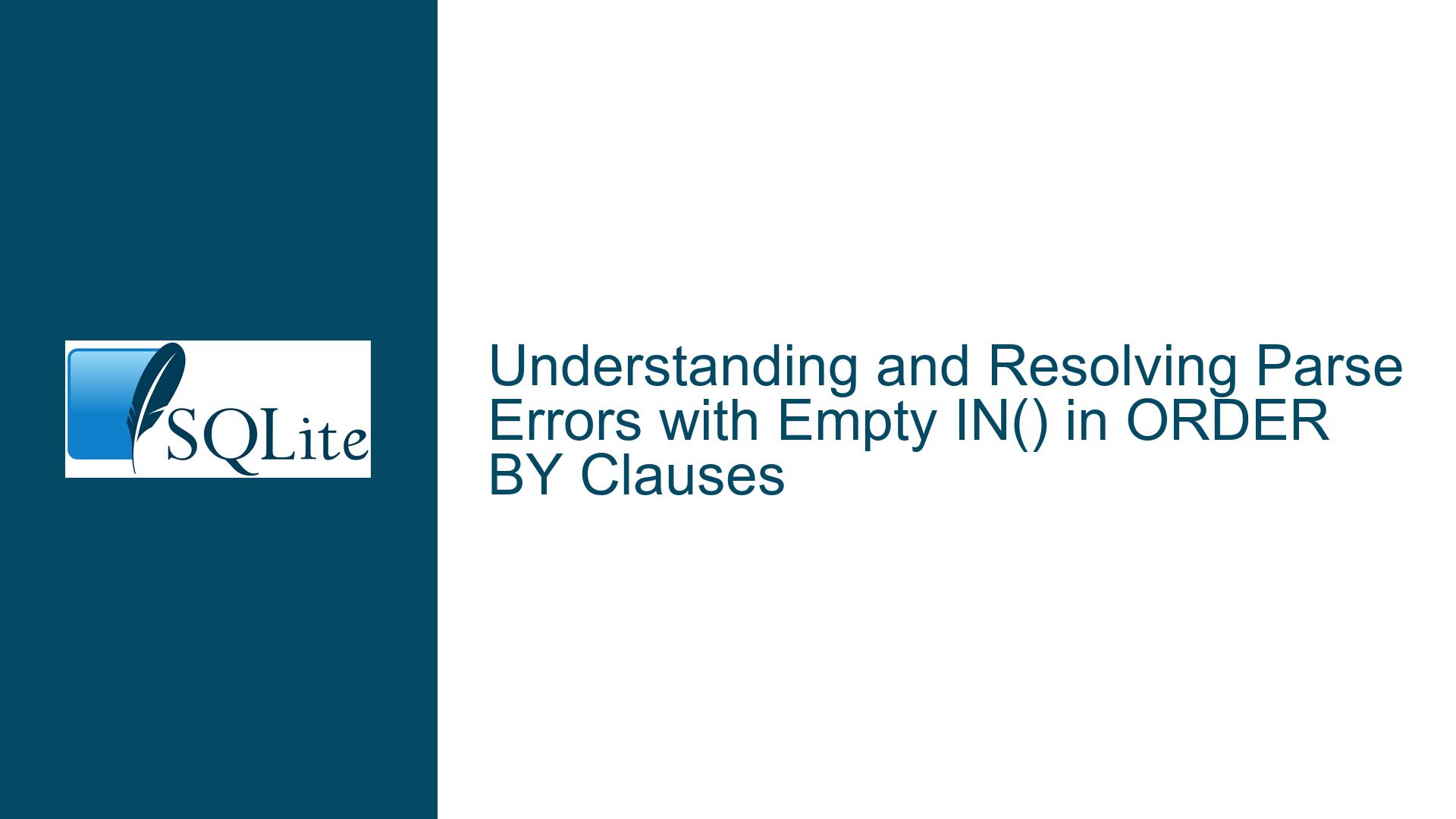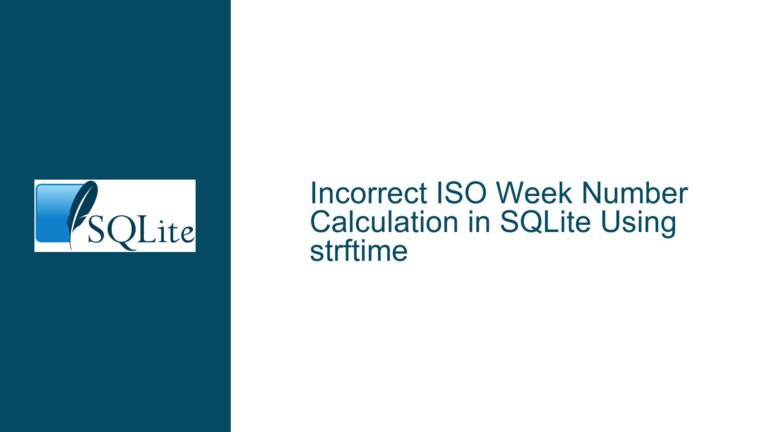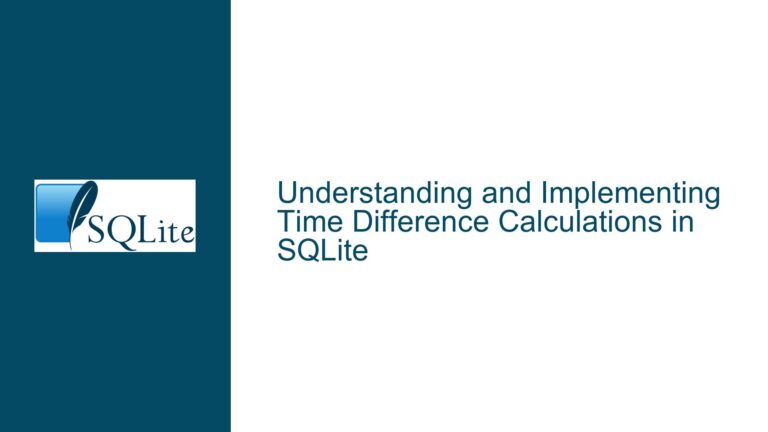and Resolving Parse Errors with Empty IN() in ORDER BY Clauses
Issue Overview: Expression Optimization Conflicts in ORDER BY Clauses
The core challenge in this scenario revolves around how SQLite’s query parser handles expressions containing empty IN() clauses within ORDER BY statements. The problem arises when a query attempts to use a conditional expression like (t0.c0 IN ()) in its ORDER BY clause, leading to a parse error: "1st ORDER BY term out of range – should be between 1 and 1". This error is counterintuitive because the syntax appears valid, and the user expects the IN() expression to evaluate as a boolean or logical value. However, SQLite’s internal optimization rules transform this expression into a constant integer under specific conditions, causing a mismatch between the parser’s interpretation and the developer’s intent.
To dissect this, consider the example query:
CREATE TABLE t0(c0);
SELECT COUNT(*) FROM t0 ORDER BY (t0.c0 IN ());
The ORDER BY clause here references an expression involving t0.c0 IN (), which the user expects to act as a boolean expression (evaluating to FALSE since no values are present in the IN list). However, SQLite’s parser replaces <expr> IN () with the constant integer 0 during early stages of query parsing. This optimization converts what appears to be a logical expression into a column index reference. Since the SELECT clause only returns one column (COUNT(*)), referencing column index 0 is invalid (column indices start at 1 in SQLite), resulting in the parse error.
This behavior stems from SQLite’s design to optimize queries by simplifying certain expressions at parse time. While this optimization improves performance, it introduces ambiguity in how expressions are interpreted in contexts like ORDER BY, where developers might expect logical evaluations rather than column index resolutions.
Possible Causes: Parser Optimizations and Expression Resolution Ambiguity
1. Early Optimization of Empty IN() Clauses
SQLite’s parser includes specific optimizations to simplify expressions involving empty sets. The expression <expr> IN () is rewritten as the constant 0 (or 1 for NOT IN ()), treating it as a boolean FALSE or TRUE in integer form. This optimization occurs before the parser determines whether the expression is part of a WHERE clause, ORDER BY, or another context. While valid in many scenarios, this rewrite becomes problematic when the expression is used in an ORDER BY clause, where SQLite allows both column indices (integer constants) and expressions. The parser misinterprets the optimized constant 0 as a column index reference instead of an expression.
2. Column Index vs. Expression Ambiguity in ORDER BY
The ORDER BY clause in SQLite permits two types of terms:
- Column indices: Integer constants referencing columns in the
SELECTresult set (e.g.,ORDER BY 1sorts by the first column). - Expressions: Arbitrary scalar expressions evaluated against the rows (e.g.,
ORDER BY LENGTH(name)).
When the parser encounters an integer literal in ORDER BY, it assumes the developer intends to reference a column index. In the example query, the optimized 0 is treated as a column index, but since the SELECT clause only produces one column (COUNT(*)), the valid range for column indices is 1 (not 0), leading to the error.
3. Legacy Handling of Boolean Expressions as Integers
SQLite does not have a native BOOLEAN type; instead, it uses integers 0 (false) and 1 (true). This design choice means boolean expressions are often represented as integers, which can lead to confusion when such expressions are used in contexts that accept both integers (as column indices) and expressions. The parser’s inability to distinguish between an integer representing a boolean result and an integer representing a column index exacerbates the issue.
Troubleshooting Steps, Solutions & Fixes: Resolving Expression Misinterpretation
Step 1: Identify Context-Specific Expression Handling
When encountering errors like "ORDER BY term out of range", first determine whether the problematic term is intended as a column index or an expression. In the example, (t0.c0 IN ()) is meant to be an expression, but the parser treats it as a column index due to optimization. To diagnose:
- Check the number of columns in the
SELECTresult set. If theORDER BYterm is an integer outside the range1toN(whereNis the number of columns), the parser is likely misinterpreting an expression as a column index. - Use
EXPLAINorEXPLAIN QUERY PLANto inspect how SQLite interprets the query. For example:EXPLAIN SELECT COUNT(*) FROM t0 ORDER BY (t0.c0 IN ());The output may reveal whether the
ORDER BYterm is treated as a constant or an expression.
Step 2: Workarounds for Immediate Fixes
If updating SQLite is not feasible, employ these workarounds:
- Explicitly Cast the Expression: Force the parser to treat the term as an expression by wrapping it in a function or operation that prevents optimization. For example:
SELECT COUNT(*) FROM t0 ORDER BY (t0.c0 IN ()) + 0;Adding
+ 0ensures the term is evaluated as an expression rather than a raw constant. - Use a Subquery: Move the expression to the
SELECTlist and reference it by column index:SELECT COUNT(*), (t0.c0 IN ()) AS expr FROM t0 ORDER BY 2;This avoids ambiguity by explicitly defining the expression as a column.
Step 3: Update SQLite to Leverage the Official Fix
The root cause was addressed in SQLite version 3.39.0 (2022-05-17) with commit d8b249e8cdf0babe, which modifies the optimization of <expr> IN () to resolve to the boolean FALSE instead of the integer 0. To apply this fix:
- Upgrade SQLite: Ensure the application uses SQLite 3.39.0 or newer.
- Verify the Behavior: Re-run the original query:
SELECT COUNT(*) FROM t0 ORDER BY (t0.c0 IN ());The
ORDER BYterm should now evaluate toFALSE(treated as an expression), eliminating the parse error.
Step 4: Adjust Query Design to Avoid Ambiguity
Prevent future issues by adopting practices that clarify intent:
- Avoid Empty
IN()Lists: ReplaceIN ()with explicit false conditions. For example:SELECT COUNT(*) FROM t0 ORDER BY (1=0); -- Equivalent to FALSE - Use Standard Boolean Expressions: Favor
CASEstatements for clarity:SELECT COUNT(*) FROM t0 ORDER BY CASE WHEN t0.c0 IN () THEN 1 ELSE 0 END;This makes the expression’s purpose explicit, reducing parser ambiguity.
Step 5: Understand Parser Optimization Boundaries
Developers should familiarize themselves with SQLite’s optimization rules to anticipate similar issues:
- Review Parser Source Code: The optimization for
IN ()is implemented inparse.y(lines 1265-1274 in commit efcb41d403b). Understanding these rules helps predict edge cases. - Test Queries Across Versions: Validate query behavior when upgrading SQLite, as optimizations and fixes may alter execution plans or interpretations.
By following these steps, developers can resolve parse errors caused by expression optimization conflicts, ensure compatibility across SQLite versions, and design queries that minimize ambiguity.






